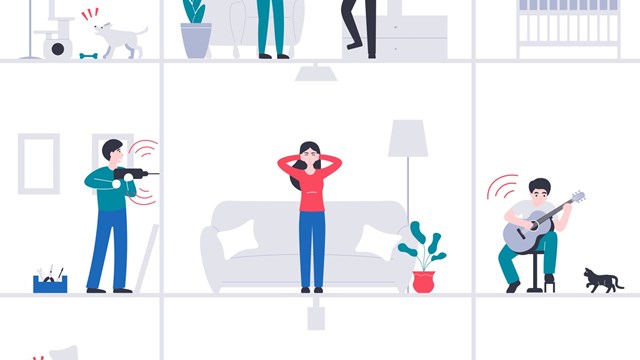
All communities, be they nation-states, municipalities, or co-op or condo buildings, have rules. Respect for -- and adherence to -- these rules is essential for many people to coexist peaceably in the same communal space. In the co-op and condo setting, rules come in two forms: bylaws and house rules.
Bylaws concern the procedural requirements for operation and governance of the cooperative corporation or condo association. These include stipulations and parameters for elections and meetings, as well as determinations on who has authority to act on behalf of the board and shareholders -- to hire someone to fix the elevator, say. Bylaws also define the relationship between shareholders and the co-op or condo association.
House rules, on the other hand, are less technical, and involve primarily quality-of-life issues. They are easier to amend -- but harder to enforce -- than bylaws, and are at the root of many conflicts a board may encounter.
Lawrence F. DiGiovanna, the current president of the Brooklyn Bar Association and an attorney with his own private practice in the borough, puts it this way: “House rules are a code of conduct; bylaws are an operational guide.”
Your Umbrella
In any co-op or condo building, there is a certain amount of communal space: foyers, hallways, staircases, elevators, basements, and so forth. House rules, first and foremost, regulate what is and is not acceptable use of those spaces.
For example, a house rule might stipulate that hallways may only be used for transit -- and not, by implication, for playing soccer, practicing with your barbershop quartet, storing your holiday ornaments, or setting up lemonade stands. Signs in courtyards that read “No Ball Playing” derive from house rules.
House rules can also govern how many plants you can place on your terrace, where you can park your bicycle and whether you can bring it into the elevator, what color you can paint your door, whether you can festoon your freshly-painted door with bumper stickers, and what is expected of you when you use the washing machines.
For the most part, house rules don’t cover what goes on inside your apartment, although there are notable exceptions. In every list of house rules, you will most likely find a restriction on noise -- hours between, say, 10 p.m. and 7 a.m. are designated “quiet time.” While this might cramp the style of the fanatical trumpet player who works nights -- indeed, the noise rule is the most common building dispute, according to John Lipuma of JAL Diversified Management Corporation -- most residents are happy with the rule.
“Just because the house rules say you can play musical instruments in a certain time frame does not give license to have “The Who” in your living room all afternoon rehearsing the same song over and over,” says Gerard J. Picaso of Manhattan-based management company Gerard J. Picaso, Inc. “You have to be conscious of other peoples’ feelings,” he says.
House rules can prohibit dishwashers and washing machines, (the case for this is that both are a drain on the communal water supply and can cause horrendous water leaks) and they can dictate what renovations you can make to your apartment. Signage is covered under house rules as well; for example, it’s conceivable that posting a political poster in your window that’s visible from the street is in violation of your building’s house rules.
Another commonly seen house rule is one prohibiting “offensive odors” that may seep into the public space. This does not mean pungent cooking, although the smell of, say, cilantro may be offensive to your nose. “Offensive odors” is usually a euphemism for excrement and/or urine -- usually from pets, but sometimes from tenants. In Lipuma’s long experience with co-ops and condos, the “offensive odor” rule is the only violation that has led to a tenant’s eviction.
Finally, house rules regulate pets. Some buildings forbid them altogether; others allow only cats or small animals; others welcome dogs as well. Generally, pets are prohibited without board approval -- this ensures that should a disobedient, barking or vicious dog move into the apartment beneath yours, the board can rescind approval if need be. And have you ever noticed that you rarely see large aquariums in New York apartments? That’s because house rules usually prohibit them for the same reason they disallow washer/dryers in private apartments -- if a forty-gallon saltwater aquarium shattered, you’d have a lot of water damage to contend with.
As with bylaws -- or any other law in New York State -- house rules may not discriminate against a protected class, as dictated in Title VII of the Civil Rights Act. Otherwise, anything goes.
A House Rule is Born
Where, and how, do house rules originate? When a building first becomes either a co-op or condo, the house rules are set forth by the sponsor -- or, more accurately, the sponsor’s attorney -- in the offering plan, along with the bylaws and the proprietary lease (for a co-op) or the declaration (for a condo).
The first draft of the house rules are often boilerplate, and sometimes make little sense. “Occasionally you’ll see a rule that prohibits plantings on the terrace, in a building that has no terraces,” DiGiovanna says.
Under the bylaws, says DiGiovanna, the board has the authority to change the house rules. Typically, all it takes is a majority of the vote at a meeting where quorum is present. Then, notice is given to the shareholders and the new rule, the changed rule, or the abolition of the rule takes effect.
The rules are typically modified once the shareholders begin to wrest more control of the board from the sponsor. Twenty years ago, this could take years. Now, with sales as brisk as they are, shareholders can assume control as soon as sixty days after the conversion to co-op or condo, or very shortly after construction is completed on their building.
“Once you have real people living in the building, and managers whose duty it is to enforce the house rules -- that’s when amendments occur,” DiGiovanna says, adding that it generally falls to the managers to advise the board on rules that make sense, rather than ones that are unenforceable.
Amendments might include allowing dishwashers in the apartments, tweaking the minimum-noise hours, or exempting cats and other small animals from board approval.
House rules change to suit the needs of the building, and each building’s needs are to some degree unique. One of Picaso’s buildings has a wine cellar, for example, so the house rules for that building have to include the wine cellar: how the wine racks are stored, how bottles should be labeled, and when the cellar may be accessed. Clearly, wine cellars are not in the boilerplate of most house rules.
“You can’t go down there after midnight,” Picaso says of his client building’s wine cellar rules. “If it’s that late, you’ve probably had enough wine already.”
Enforcement
“House rules don’t have the force of bylaws, although they are enforceable, pursuant to provisions in the proprietary lease,” explains DiGiovanna.
As an example, DiGiovanna uses a hypothetical shareholder named Dave, a consultant who is out of town five nights a week and owns a yapping lapdog that barks incessantly whenever he’s not home. Mary, his downstairs neighbor in the co-op, complains to him about the dog’s noise, but to no avail. She takes her grievance to the board. The board concludes that not only is Dave is violation of the “noise” house rule, he never bothered to get approval to have the dog in the first place -- another no-no.
The board then files a notice to cure -- a formal declaration to Dave that he is in violation of house rules and must conform within, say, 30 days, or else.
Dave decides to ignore the warning. Thirty days come and go, and his dog is still yapping the night away. The board then has no choice but to serve a notice of termination of the proprietary lease.
At that point, Dave could either sell his apartment or ship his dog to the suburbs. If not, there would follow a byzantine series of technical legal back-and-forth known as a landlord/tenant dispossess proceeding.
In this case, with the board and the other tenants against him, Dave would almost certainly lose. The precedent, DiGiovanna explains, is the Pullman case, a recent decision that “takes away from the court the ability to determine if conduct is objectionable. Now, the shareholders [or board] can make that distinction.”
Squabbles over house rules rarely get to that point, of course. To breach the proprietary lease, a house rule must be violated frequently enough to establish a behavior, as with the case of Dave’s dog. More often than not, however, a house rule will be violated once. A tenant will have a raucous party that goes till three in the morning, in violation of the noise statutes, but won’t have another party for a year.
Another difficulty is that noise is in the eye -- or ear, in this case -- of the beholder. “Most noise claims are unfounded,” says Lipuma. Many complaints revolve not around loud music but the sound of footsteps -- hardly grounds for eviction.
Finally, some house rules are more shades-of-gray than black-and-white. Picaso says that a house rule that tends to generate lively discussion at the annual meeting is one stating that employees of shareholders must use the service elevator. Some of the employees live with the shareholders and are considered members of the family; on the other hand, they often engage in activities like buying groceries, taking out trash and doing laundry that are better suited for the service elevator. How to adjudicate something like that?
“There is no answer,” Picaso says.
The best way to fashion house rules, then, is to make sure that living under them is feasible.
“In the end,” Picaso says, “it’s up to the shareholders to abide by the rules -- you can go to court, but really, people have to do it themselves.”
Greg Olear is a freelance writer and a frequent contributor to The Cooperator.









14 Comments
Leave a Comment